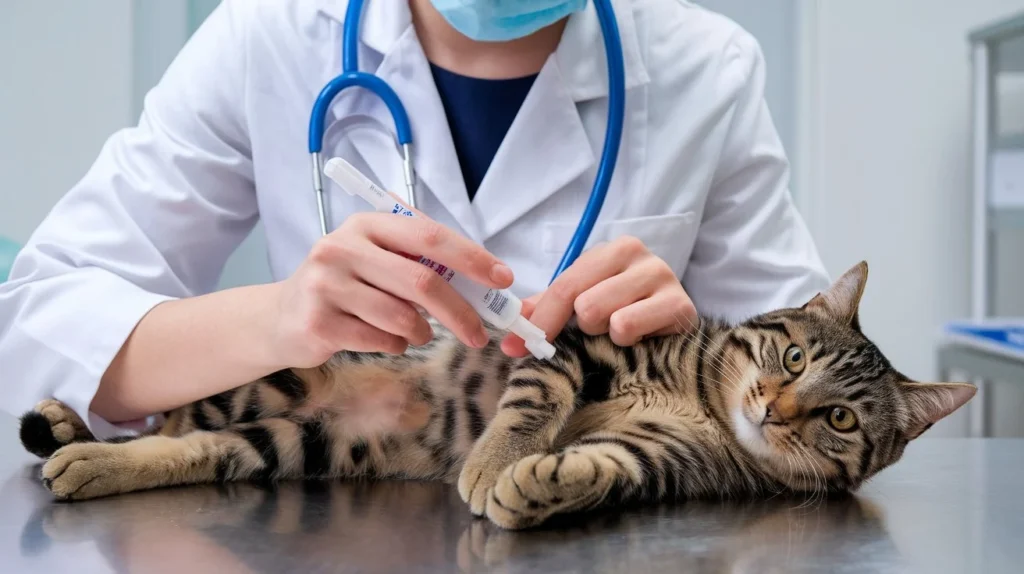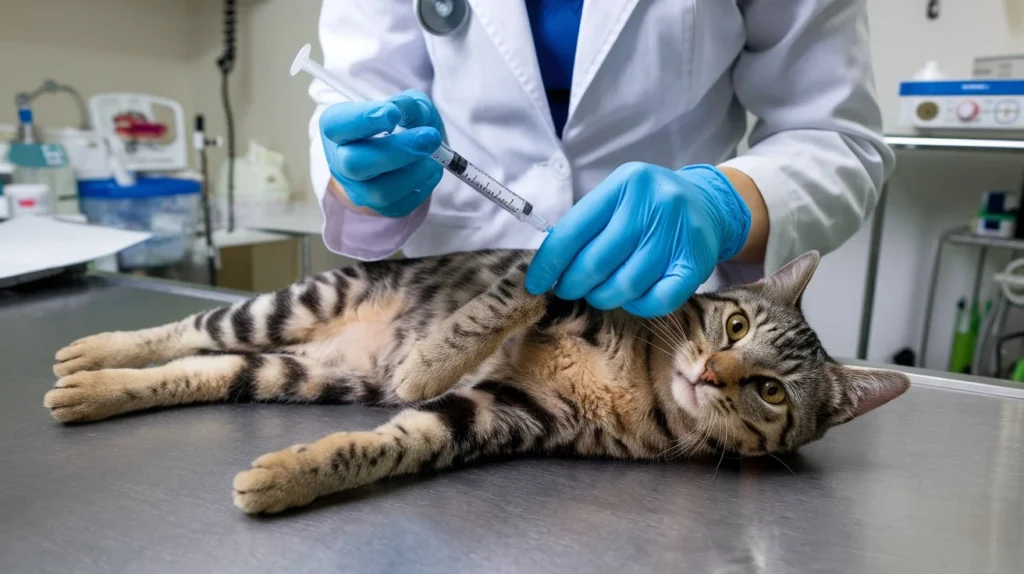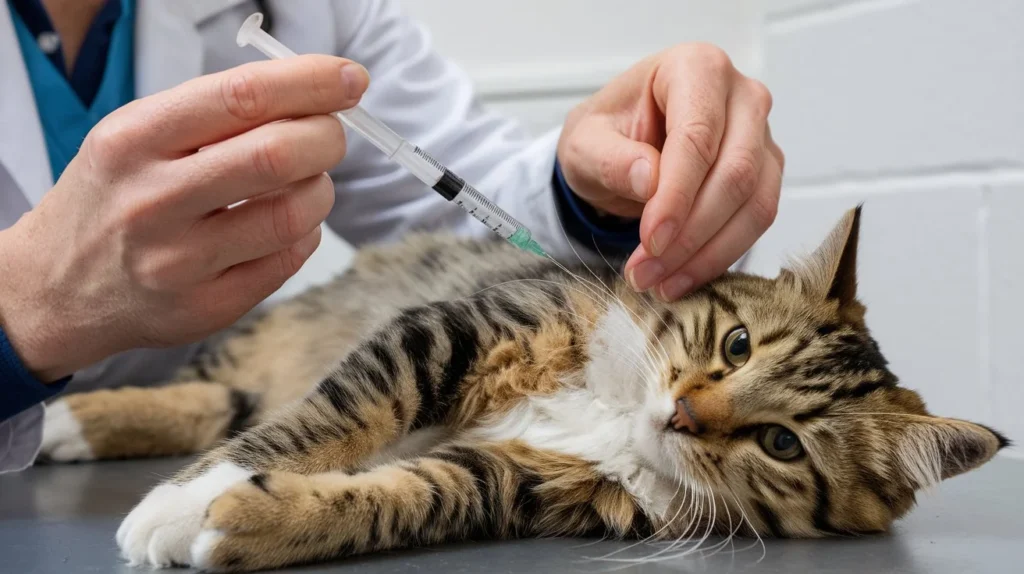Have you ever wondered how long does dewormer take to work in cats? If so, you’re certainly not alone in this concern. As a matter of fact, many cat owners find themselves pondering this crucial question when it comes to their feline friend’s health. In this comprehensive guide, we’ll thoroughly explore everything you need to know about cat dewormers, their effectiveness, and the timeline for observing results.
Understanding Cat Dewormers: A Quick Overview of Feline Parasite Treatment
Before we delve into the specifics of how long does dewormer take to work in cats, let’s first briefly discuss what dewormers are and why they’re absolutely essential for your cat’s overall health and well-being.
What Are Cat Dewormers and How Do They Function?
Dewormers for cats are some types of special medicines manufactured to kill internal parasites such as roundworms, hookworms, and tapeworms in cats. If left untreated, these can result in several health problems in felines, from a mere simple annoying problem to life-threatening conditions.
Why Are Dewormers Crucial for Your Cat’s Health?
Dewormers play an undeniably vital role in maintaining your cat’s overall health and well-being. To be more specific, they help:
- Effectively eliminate existing parasites
- Proactively prevent future infestations
- Significantly improve your cat’s nutrition absorption
- Substantially boost their immune system
Now that we’ve covered these fundamental aspects, let’s address the burning question: how long does it take dewormer to work in cats?
How Long Does Dewormer Take to Work in Cats: The Comprehensive Timeline
The effectiveness of dewormers can, unsurprisingly, vary depending on several factors. However, in general, here’s what you can typically expect:
Immediate Effects: The First 24-48 Hours of Deworming Treatment
Within the initial 24 to 48 hours after administering the dewormer, you may notice the following:
- Increased activity in your cat’s digestive system
- Possible diarrhea or vomiting (in some cases)
- Visible worms in your cat’s stool or vomit
It’s important to note that these immediate effects don’t necessarily mean the dewormer has fully completed its job. Instead, the medication is just beginning to work its magic.
Short-Term Effects: Deworming Progress in 3-7 Days
As we continue to explore how long does deworming medicine take to work in cats, let’s examine the short-term effects:
- Noticeable reduction in visible worms in stool
- Improved appetite and eating habits
- Increased energy levels and playfulness
- Better coat condition and appearance
During this period, the dewormer is actively eliminating the parasites from your cat’s system, leading to these observable improvements.
Long-Term Effects: Complete Deworming Results in 2-4 Weeks
For a comprehensive answer to “how long does a dewormer take to work in cats,” we need to consider the long-term effects:
- No visible signs of worms in stool
- Significant weight gain (if your cat was previously underweight due to parasites)
- Shinier, healthier coat with improved texture
- Overall improvement in health, vitality, and behavior
By the end of this period, most dewormers will have completed their course of action, effectively ridding your cat of parasites and restoring their health.

Factors Affecting Dewormer Effectiveness in Feline Parasite Treatment
Now that we’ve outlined the general timeline, it’s important to understand that several factors can influence how long does dog dewormer take to work in cats (yes, some dewormers are indeed effective for both species!):
- Type and species of parasite infesting your cat
- Severity and extent of the parasite infestation
- Cat’s age, weight, and overall health condition
- Type and brand of dewormer used for treatment
- Correct dosage administration and adherence to treatment schedule
Let’s delve deeper into each of these factors to gain a better understanding of their impact on dewormer effectiveness in cats.
Type and Species of Parasite: How Different Worms Affect Treatment Duration
Different parasites may require varying treatment durations. For instance:
- Roundworms: Generally respond quickly to treatment, often within 24-48 hours
- Hookworms: May take 2-3 weeks for complete elimination from the system
- Tapeworms: Can take up to 30 days for full eradication due to their lifecycle
Understanding the specific parasite affecting your cat can help set realistic expectations for how long does dewormer take to work in cats.
Severity of Infestation: Impact on Deworming Treatment Duration
The more severe the parasite infestation, the longer it may understandably take for the dewormer to completely eliminate all worms. In some cases, a second dose may be necessary to ensure all parasites are thoroughly eradicated.
Cat’s Age and Overall Health: Influence on Dewormer Effectiveness
Younger cats and those in good health generally respond more quickly to deworming treatments. On the other hand, senior cats or those with compromised immune systems may take longer to show noticeable improvement.
Type of Dewormer Used: Variations in Treatment Approaches
Different dewormers work in various ways, which can affect their speed and effectiveness:
- Single-dose treatments for quick action
- Multi-dose treatments for prolonged protection
- Broad-spectrum dewormers targeting multiple parasites
- Parasite-specific dewormers for targeted treatment
The type of dewormer prescribed by your veterinarian can significantly impact how long does it take dewormer to work in cats.
Correct Dosage Administration: Ensuring Optimal Dewormer Efficacy
Proper administration of the dewormer is crucial for its effectiveness. Always follow your veterinarian’s instructions carefully to ensure the best results and quickest parasite elimination.
Signs That the Dewormer Is Working in cats: Indicators of Successful Parasite Treatment
As a concerned cat owner, you’re likely eager to see signs that the dewormer is doing its job effectively. Here are a few promising signs to keep an eye on:
- Visible worms in stool (initially, as parasites are expelled)
- Improved appetite and increased food intake
- Steady weight gain and improved body condition
- Increased energy levels and playfulness
- Better coat condition with increased shine and softness
- Reduced belly bloat and improved overall appearance
Remember, while these signs are undoubtedly encouraging, it’s essential to complete the full course of treatment as prescribed by your veterinarian for optimal results.

Potential Side Effects of Dewormers: What to Expect During Treatment
While dewormers are generally safe and effective, it’s important to be aware of potential side effects that may occur. These may include:
- Temporary loss of appetite or reduced food intake
- Mild diarrhea or vomiting in some cases
- Lethargy or decreased activity levels
- Excessive salivation or drooling
If these side effects persist or worsen, it’s crucial to contact your veterinarian immediately for professional advice and guidance.
The Importance of Follow-Up Treatment: Ensuring Complete Parasite Eradication
Understanding how long does dewormer take to work in cats is just the first step in effective parasite control. Follow-up treatment is often necessary to ensure complete eradication of parasites. Here’s why:
- Some dewormers only target adult worms, not eggs or larvae
- Reinfection can occur if the environment isn’t properly treated
- Certain parasites may require multiple treatments for full elimination
Always follow your veterinarian’s recommendations for follow-up treatments and preventive measures to ensure long-term parasite control.
Preventing Future Parasite Infestations: Proactive Measures for Cat Health
Now that you know how long does dewormer take to work in cats, let’s discuss prevention strategies to keep your feline friend parasite-free:
- Adhere to a regular deworming schedule as recommended by your vet
- Keep your cat indoors to reduce exposure to parasites from the environment
- Clean litter boxes daily to prevent reinfection
- Practice good hygiene, especially after handling your cat or cleaning litter
- Use flea prevention products, as fleas can transmit certain parasites
By consistently implementing these preventive measures, you can help keep your feline friend healthy and parasite-free in the long run.
When to Consult Your Veterinarian: Seeking Professional Advice for Deworming
While understanding how long does dewormer take to work in cats is undoubtedly helpful, there are times when you should seek professional advice:
- If you notice no improvement after the expected treatment period
- If your cat’s symptoms worsen or new symptoms appear
- If your cat experiences severe side effects from the dewormer
- For routine check-ups and preventive care to maintain optimal health
Remember, your veterinarian is your best resource for ensuring your cat’s optimal health and well-being throughout the deworming process.
Conclusion: how long does dewormer take to work in cats
In conclusion, the answer to “how long does dewormer take to work in cats” isn’t a one-size-fits-all solution. While you may see some immediate effects within 24-48 hours, complete eradication of parasites can take anywhere from a few days to several weeks, depending on various factors we’ve discussed.
The key to successful deworming is, without a doubt, patience and persistence. Follow your veterinarian’s instructions carefully, complete the full course of treatment, and implement preventive measures to keep your feline friend healthy and happy in the long term.
That said, a parasite-free cat is definitely more energetic and healthy. By knowing how deworming works and when it should be performed, you are taking a very important step in taking good care of your beloved feline friend. You will ensure that the life of your cat will be happy, healthy, and free of parasites by mere administering of the right treatment on time.








